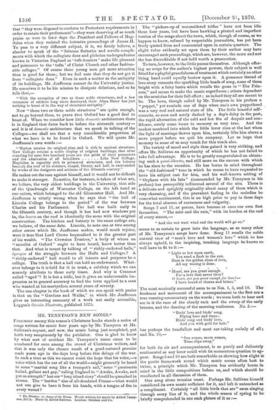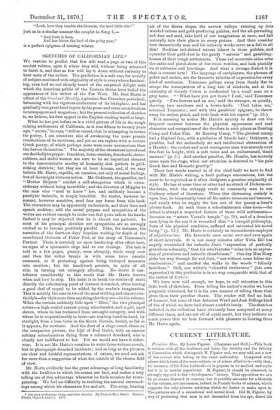MR. TENNYSON'S NEW SONGS.* FOREMOST among this season's Christmas books
stands a series of songs written for music four years ago by Mr. Tennyson at Mr. Sullivan's request, and now, the music being just completed, put forth very sumptuously by the publisher. One is glad to know by what sort of accident Mr. Tennyson's name came to be numbered for once among the crowd of Christmas writers, and that it was only the chance result of a good-natured promise made years ago in the days long before this deluge of the war. In such a time as this we cannot resist the hope that his voice,—a voice which has the ear of all the world—might presently be heard in some "martial song like a trumpet's call," some "passionate ballad, gallant and gay," calling England to "Awake, Awake, and put on strength!" lest our "long island story" should be quenched in shame. The " burden " also of all-desolated France—what would not one give to have it from his hands, with a tongue of fire in every wound ?
• The Window; or, Songs of The Wrens. Words written for music by Alfred Tenny- son, D.C.L. Music by Allred Sullivan. London: Strshan and Co.
The "pickers-up of unconsidered trifles" have not been idle these four years, but have been hawking a pirated and imperfect version of the songs about the town, which, though of course, as we happen to know, refused by respectable journalists, has yet been freely quoted from and commented upon in certain quarters. The slight value evidently set upon them by their author may have encouraged such proceedings, which are, however, the more and not the less discreditable if not held worth a prosecution.
To turn, however, to the little poems themselves. Although offer- ing no scope for the author's highest powers, their subject is well fitted for a playful gracefulness of treatment which certainly no other living hand could equally bestow upon it. A gossamer thread of love-story connects the sparkling little beads of song, some of them bright with a fairy lustre which recalls the gems in "The Prin- cess," and seems to make the music superfluous ; others dependent on the musician for their full effect ; as indeed they all are meant to.
be. The hero, though called by Mr. Tennyson in his preface a "puppet," yet reminds one of days when one's own puppethood was a very real and natural state of life. The little boastful self- conceits, so soon and sorely dashed by a day's delay in the post, the rapid alternation of the cold and hot fits of despair and con- fidence, surely come home to memory as very true. And the modest manhood into which the little lover rises at the last when the light of marriage dawns upon him, certainly lifts him above a mere puppet before we quit his company. Let us hope that memory in some of us may vouch for this touch also.
The variety of mood and style thus gained is very striking, and
offers Mr. Sullivan an opportunity of which he has not failed to- take full advantage. He is to be greatly congratulated on obtain- ing such a quasi-libretto, and still more on the success with which
he has risen to the occasion. He has borne in mind throughout the " old-fashioned " tone in which he seems to have requested to. have his subject cast for him, and his well-known setting of "Orpheus with his lute" (commended by Mr. Tennyson in his. preface) has perceptibly influenced several of the airs. There is- a delicate and sprightly originality about many of them which is very charming, and if the prevalent feeling in the melodies be somewhat sentimental, this is no high price to pay in these days.
for the total absence of coarseness and vulgarity.
Songs 7 and 11, as poems, have become at once our own first favourites. "The mist and the rain," with its burden at the end of every stanza,—
" And the wet west wind and the world will go on."
seems to us certain to grow into the language, as so many other of Mr. Tennyson's songs have done. Song 11 recalls the noble natural view of "men's love and women's love" which he has always upheld, in the inspiring, touching language he knows so. well have to fit to it :—
" Light so low upon earth,
You send a flash to the sun. Here is the golden close of love, All my wooing is done.
"Heart, are you great enough For a love that never tires?
0 heart, are you great enough for love f— I have heard of thorns and briars."
The most musically successful seem to us Nos. 1, 5, and 10. The freshness and movement of the accompaniment to the first are a. true running commentary on the words ; we seem both to hear and see in it the race of the cloudy rack and the sweep of the early breezes, and the dancing of the morning sunbeams. No. 5 :—
" Birds' love and birds' song. Flying hero and there ; Birds' song and birds' love' And you with gold for hair."
has perhaps the tunefullest and most ear-taking melody of all ; and No. 10,—
" Snn comes, moon comes, Time slips away,"
for both its air and accompaniment, is as purely and delicately sentimental as any lover could wish its momentous question to ap- pear. Songs 5 and 10 are both remarkable as showing how slight ia. the poetic framework round which music seems often best to twine, a principle which Mr. Tennyson has evidently borne in mind in the little compositions before us, and which should be- recollected in all discussion of them.
One song alone remains unset. Perhaps Mr. Sullivan himself considered its own music sufficient for it, and left it untouched as a compliment. Certainly "all little birds that are" seem singing through every line of it, and the whole season of spring to be briefly comprehended in one such phrase of it as :—
"Look, how they tumble the blossom, the mad little tits ! just as in a similar manner the couplet in Song 4,— " And frost is here,
And has bitten the heel of the going year,"
is a perfect epigram of coming winter.



































 Previous page
Previous page